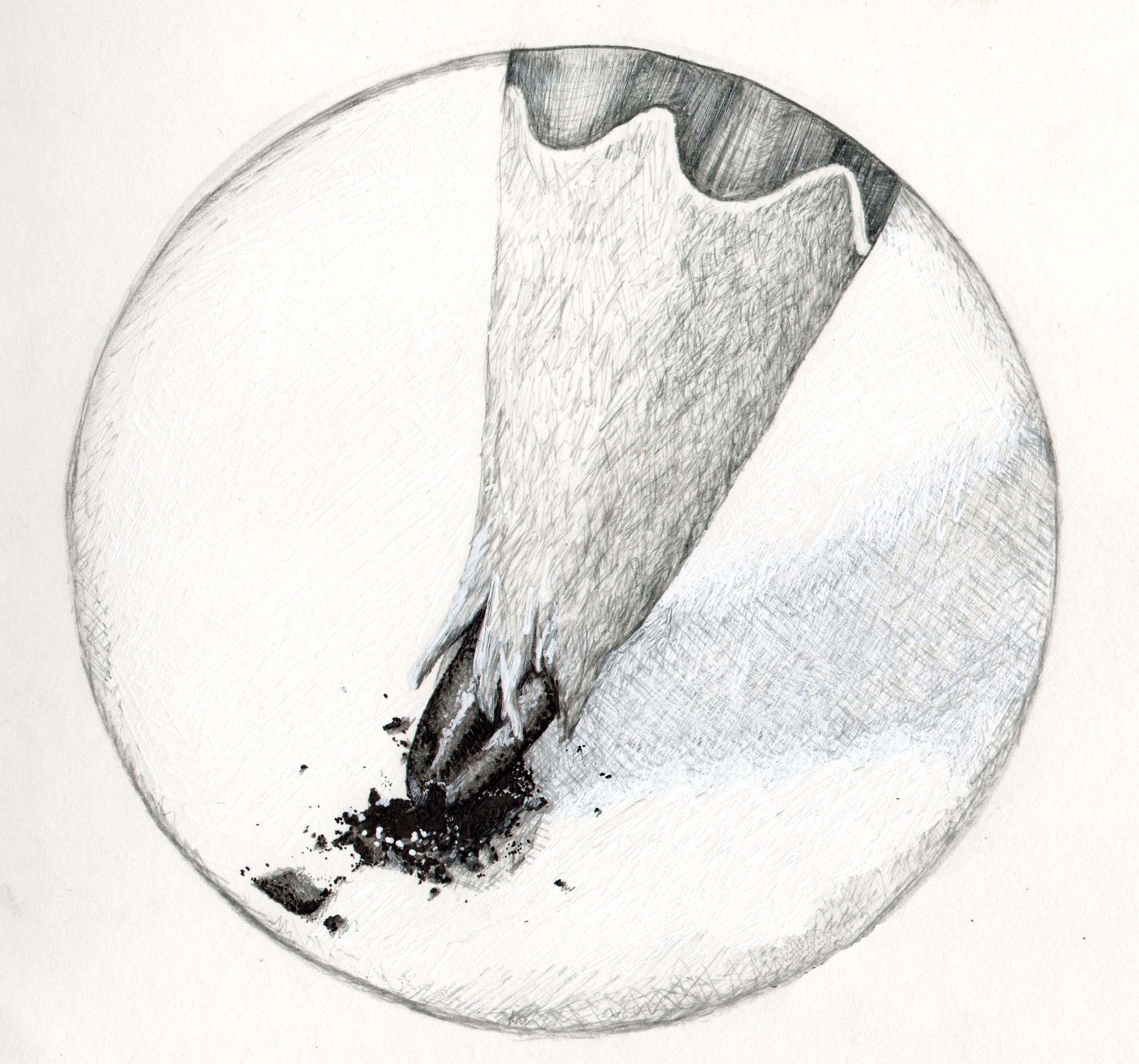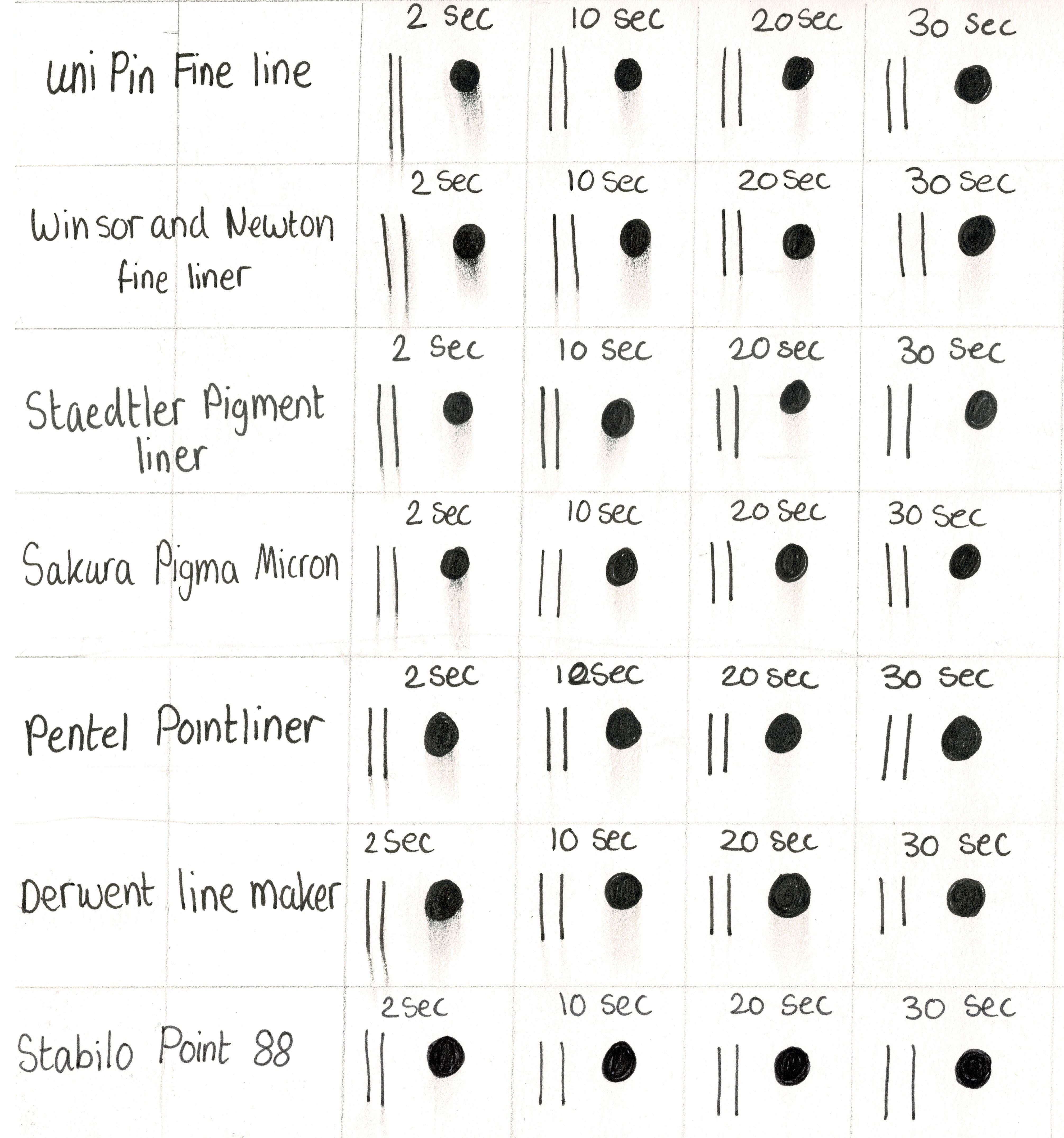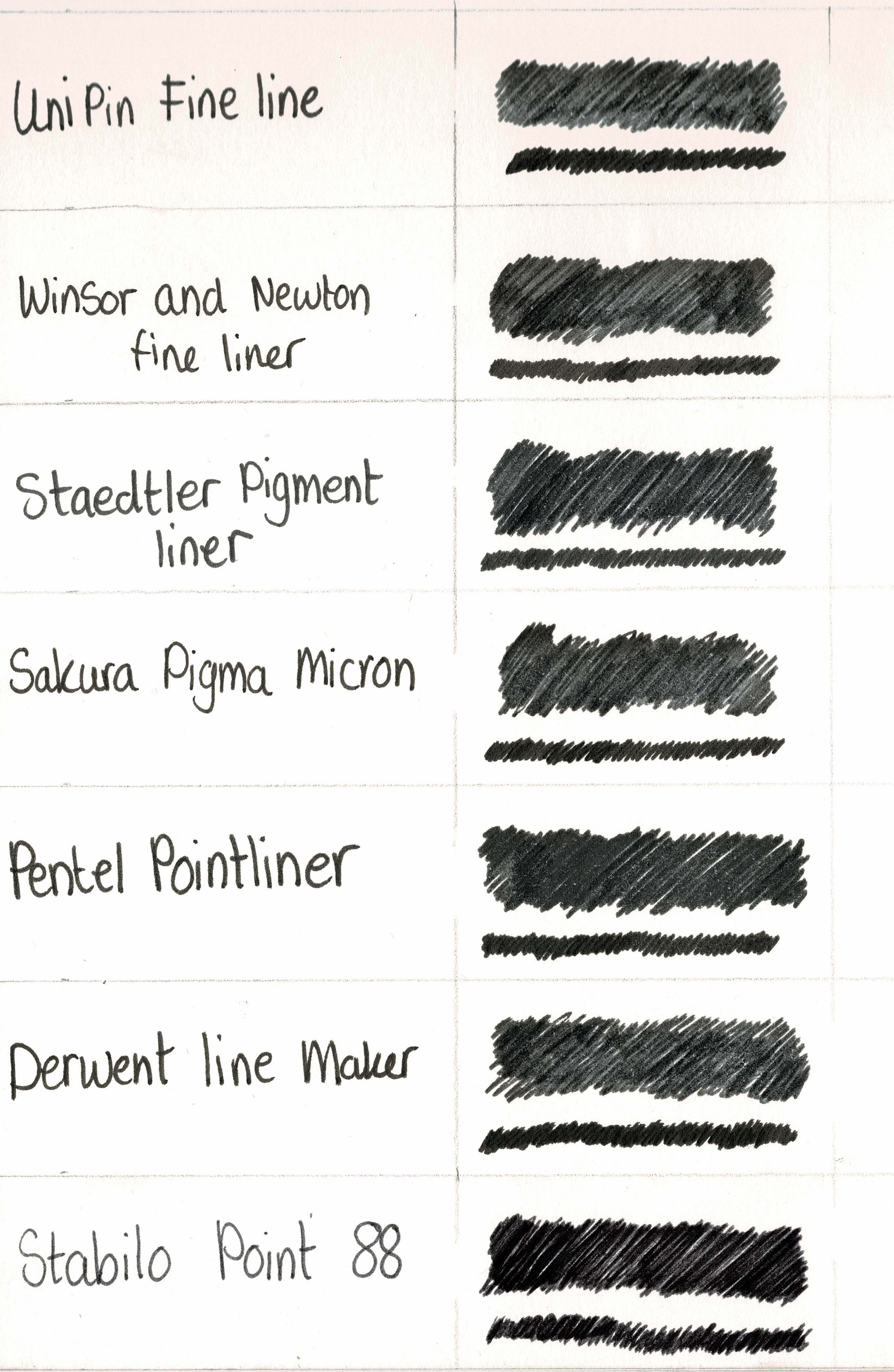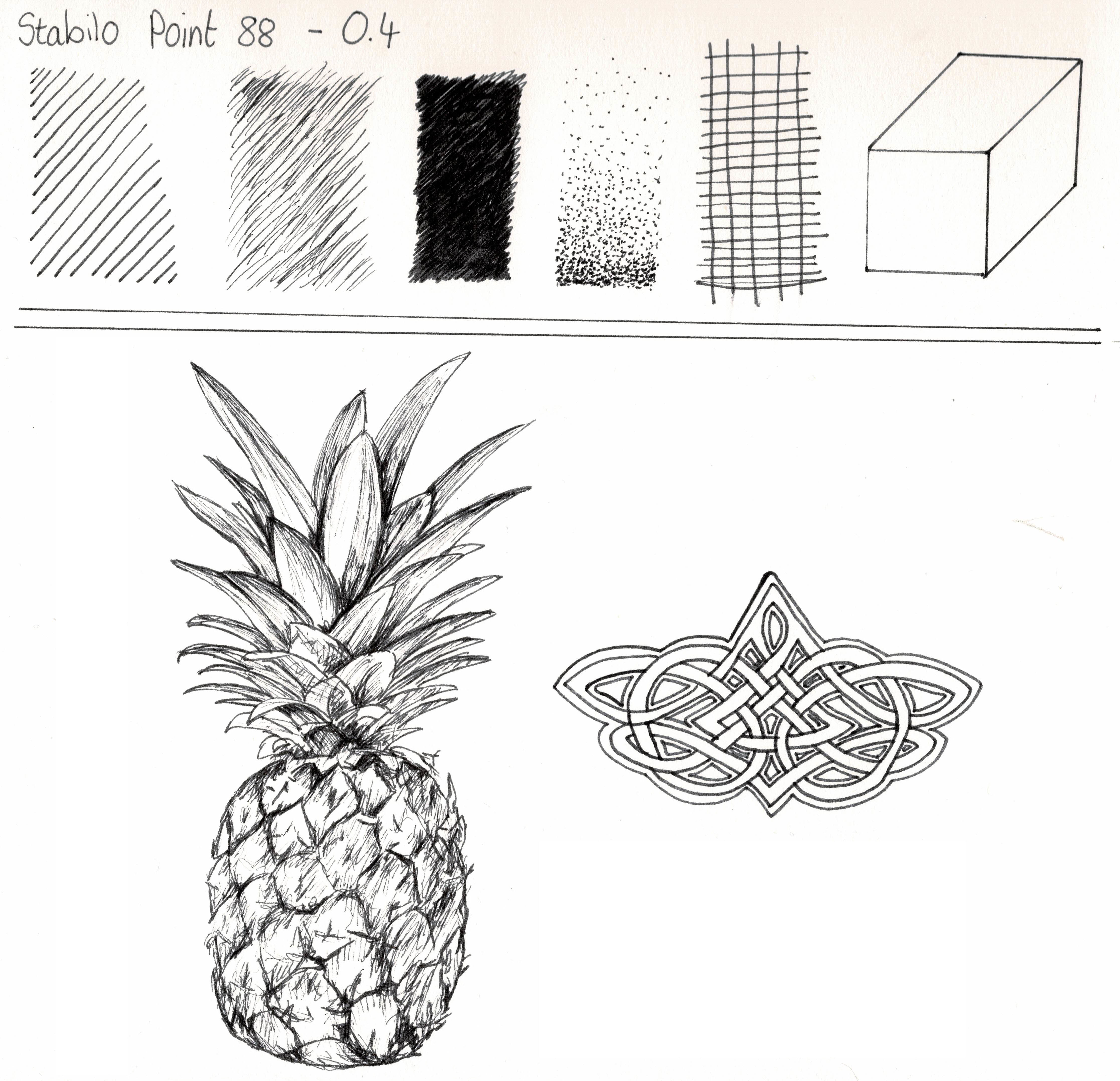
What Is The Best Fineliner Pen
Monday 02 March 2020 - Sandra MRead Sophie Knight's review on the best fineliners
Which Fineliner is the best for using with marker pens? Find out all about fineliners pens here.
Hi, I’m Sophie and work at the Pullingers Art Shop in Epsom. I’m an artist and I spend a lot of my time doing daily drawing challenges with fineliner pens. You may have seen some of my drawings on the Pullingers Instagram page for Inktober. You can find more of what I do at www.sophieknightart.co.uk Anyway Pullingers have asked me to review my favourite fineliner pens for drawing, so here we go.
Fineliner pens are generally used for drawing and sketching. They have a felt or plastic fibre nib and come in a range of sizes and colours. Fineliner pens are normally disposable and are a much cheaper options than technical pens. When it comes to finding the best fineliner, most artists, illustrators and graphic designers will have their favourites and there are many different reasons for their choices; it’s the blackest pen, it has the most controlled line, the feel of the nib, the resistance to alcohol-based markers, etc. There are many elements to consider. Sometimes it will take a few attempts to find the right fineliner for you.
I normally draw with fineliners in a Seawhite Sketchbook which has 160gsm white cartridge paper. There is a slight grain but it’s mostly smooth and most fineliner pens take to this paper well (they’re not scratchy). This is the type of paper I will be using throughout this review.

My Favourite Fineliner Pen And Why:
I use many different fineliners but I do tend to find myself reaching for the Uni-Pin Fineliner over all others. It’s comfy to use and the nibs are hardwearing, great for me as I can be a bit heavy handed at times. The ink flows smoothly but with enough resistance to keep the pen controlled, it’s a good balance especially when I’m drawing something detailed like a portrait. The fineliner pens not only come in black but also sepia, light grey and dark grey, which is nice for a bit of variation. The greys can almost look like pencil marks.


The Uni-Pin Fineliner is a good all-rounder pen but it’s not the only fineliner pen out there. There’s a massive selection to choose from.
Our best-selling fineliner pens are:
- Winsor & Newton Black Fineliners,
- Staedtler Pigment Liner Pens,
- Sakura Pigma Micron Fineliners,
- Stabilo Point 88 Fineliners.
For this review I will be testing out these fineliners for blackness, smudging, bleeding, line work and smoothness. I will then summarise on which one I think is the best fineliner.
What Fineliner Has The Best Range Of Nib Sizes Available?
:
The Staedtler Pigment Liner is winning here, with 11 different nib sizes available. It comes in a broad 1.2 nib as well as an excellent selection of smaller sizes. The Uni-Pin and Pigma Micron Fineliners have the smallest nib size at 0.03. It gives you good precision, but you do have to be careful not to press too hard as it is very delicate. I’ve found the 0.1 nib size holds up much better over time.
My go to nib size for a fineliner will depend on what type of drawing I’m doing. This generally ranges from 0.1 through to a 0.5. I like to put a lot of detail in my drawings and I find the smaller nibs work best for me. I may use a lager nib if I’m block colouring an area but otherwise I prefer a smaller nib. For this review I’m comparing fineliners with a 0.5 nib, apart from the Stabilo Point 88, which only comes in a 0.4.
:
Already I have noticed a difference in the 0.5 nib sizes across the brands. The Pentel Pointliner is thicker and the Winsor & Newton Fineliner seems much thinner. The Sakura Pigma Micron Fineliner also seemed slightly narrower, however on closer inspection of the pen it does say the line width is 0.45.
What Is The Blackest Fineliner?
Sometimes really dark areas of a drawing or sketch can really bring it to life. Black works really well with bright colours and for some artworks getting the blackness right is the different between making a picture pop or not.
For this test we are looking at how black the ink is. I have filled in a 1cm square block using each brand of fineliner pen. I will then compare them, seeing which is the lightest black and which is the darkest.
:
Window - Uni-Pin Fineliners and Faber-Castell Polychromos Pencils By Sophie Knight
The results of this test surprised me. Over-all the Stabilo Point 88 Fineliner seems to be the darkest followed by the Winsor and Newton Fineliner. This may due to a little bit of over lapping as these two pens have smaller nibs so more marks are need to get a solid block of colour.
The Uni-Pin and Sakura Pigma Micron Fineliners also had very good results. The Pentel Pointliner may not have had the blackest ink but was the easiest to get a solid block of black.
As I said before, I’m using a cartridge paper so the results may vary on different paper, but I was really impressed by how black the Stabilo Point 88 pen was considering it is the cheapest in the range.
The results on the right show the fineliners in order of darkest to lightest.

What Is The Best Colour Availability In A Fineliner Brand?
:
For the most part, fineliners come in black. This is great for most drawings but sometimes it’s nice to add some colour. Four of the fineliner brands that I’m reviewing come in colours other than black. As I’ve already said, the Uni-Pin Fineliners come in sepia, light grey and dark grey. I’ve had some great results working in these but it’s still quite a limiting colour palette if you want to add colour. If you want to go full rainbow your best choice is going to be the Stabilo Point 88 Fineliners, with a whopping 25 colours.
:
Which Fineliner Pen Smudges The Least
For this test we are looking at how much the fineliners smudge. It can be really annoying when the bottom of your hand goes over your drawing and the wet ink smudges (especially if you’re left-handed). The first thing I did with this test was draw two lines and a blocked circle. Immediately after, I rubbed my finger over it. I repeated this after 10, 20 and 30 seconds to see how long the ink took to dry.
Again, the cheapest fineliner, the Stabilo Point 88, surprised me. Each fineliner did smudge on the first go especially from the blocked circle but the Stabilo Point 88 held up really well and only smudged a little immediately after applying the ink to the paper. By 10 seconds, the ink was dry and so no smudging. The Pentel Pointliner came in second, followed by the Uni-Pin Fineliner. The only pen to smudge at 30 seconds was the Winsor & Newton Fineliners, but this was only very slight.

Which Fineliner Won't Smudge When Used With Alcohol-Based Markers?
Marker pens are great for adding colour, tones and shading to a drawing. These can be water-based, solvent-based or alcohol-based. However, if you are using a marker pen that is not compatible with your fineliner, it can lead to feathering and smudging. Feathering occurs when the ink moves and blurs, makings lines seems thicker, whereas smudging drags the ink across the stroke on the nib of the marker, making it a dull colour.

Test 1 – Will the Fineliner ink smudge when used with the alcohol-based Marker Pens?
For this test we are looking at how well the fineliners work with alcohol markers. I am using a Winsor & Newton ProMarker Brush Pen. So that the smudging can be seen easily, I have chosen an amber coloured pen to use with the fineliners. I’ve drawn a series of different marks with fineliners and gone over the top of them with the ProMarker. In the fourth test, I put the coloured marker down first and drew over the top in the fineliners to see how that compared
:
The best fineliner to use with alcohol-based Markers like the Winsor & Newton ProMarker and Copic Ciao, is the Pentel Pointliner. It was the only one that did not seem to smudge when used with the Promarker. The Stabilo Point 88 also worked really well but did feather a tiny bit where the marker was applied thickly. The Winsor and Newton Fineliner was the least compatible which surprised me. I assumed it would work well with the Promarker as they are both from Winsor and Newton. All the fineliners worked well on top of the Promarker without any feathering or smudging.
Test 2 - Will the Fineliner ink smudge when used with Watercolour Paints?
For this test we are looking at how well the fineliners work with watercolour paints. I am using Winsor & Newton Cotman Watercolour Paints. Again, I have chosen a nice bright lemon yellow hue colour to see the results easily.
Personally, I rarely use watercolours and fineliners together, but I am aware that a lot of artists do. Most of the pens held up well in this test. There was some smudging with the Uni-Pin Fineliner which made the yellow look a little dirty but compared to the Stabilo Point 88 this was miniscule. The Stabilo Point 88 Fineliner has a water-based ink so it really shouldn’t be used with watercolour paints. As you can see, by adding even more water, the pen ink just dissolved on the page.

Test 3 – Will the Fineliner ink smudge when used with Inks?
For this test we are looking at how well the fineliners work with inks. I am using two types of ink for this test. The first test is the fineliners with Winsor & Newton Drawing Inks. This is a shellac dye-based ink. I am using canary yellow ink in this experiment.
The second ink test is Daler Rowney FW Ink. This is an acrylic-based ink and we are using Lemon Yellow. Again, I have I’ve drawn a series of different marks with the fineliners and gone over them with the ink.
I do use drawing inks with fineliners in some of my drawings, but I will put the ink down on the page first and work over the top with the fineliners once the ink is dry.
:
Both inks produced similar results for this test. All the fineliners resisted smudging quite well apart from the Stabilo Point 88 Fineliner. Again, with it being water-based, this was expected. I did notice some small smudging from the Winsor & Newton Fineliner when used with the Drawing Inks, especially on cross hatched marks, but it performed fine with the Acrylic Inks. I also tested the fineliners on top of the ink once dry. All pens worked well, but the Stabilo Point 88 seemed much more faded.
:
Which Is The Best Fineliner For Stencilling?
All the fineliners worked quite well in this stencil test. The ink didn’t smudge or bleed through the stencil and all lines turned out precise. I would recommend using a finer nib. Most of these pens are 0.5. I should have used a 0.3 fineliner, especially as my lettering stencil is 30mm. Three of the pens that I’m reviewing do have a finer nib (The Winsor & Newton Fineliner, the Sakura Pigma Micron Pen and the Stabilo Point 88). These ones performed better and were easier to use in the stencil.
:
Can The Fineliner Ink Be Erased?
For this test we are looking at how the pen fades once it’s been erased. This is useful to know if you’re drawing in pencil and go over it with a fineliner and want to erase the pencil marks afterwards. I used a Staedtler Mars Plastic Eraser and I did press down quite hard. The top block of colour is the eraser one. I put a second line below so that you can see how it compares.
I was quite surprised how every pen did fade slightly in this test. Most of these are permanent fineliners, but I did use the eraser quite soon after drawing so maybe the ink hadn’t had enough time to completely dry. The Pentel Pointliner had slightly more resistance to the erasing than the others but the best here is the Stabilo Point 88 Fineliner.

Fineliners - Tips & Drawing Techniques:
Now for my favourite part of the review, drawing! This is the main thing I use fineliners for. I’m going to make a series of marks to get a feel for each pen. I will try out some ruled lines and of course a few drawings. Some will be more sketch like, others more graphical or cartoony. I will also be telling you about some of the best features of these pens and how comfy I find each one to use.
The Uni-Pin Fineliner:
:
As I’ve said before the Uni-Pin Fineliner Pen is the one that I’m most familiar with. It’s smooth to use when sketching, produces a good range of lines and marks and you can easily apply less pressure to achieve finer marks. It works well with more graphic and cartoon styles too.
The pen nib is hardwearing on all sizes. It’s always best to recap the pen when you’re not using it to avoid it drying out. I’ve found that this pen lasts quite a long time and I do use it a lot.
The barrel has a matt finish making it comfortable to hold and it doesn’t slip in my hand. The lid has a clip and a little window where you can see the nib. The ink in the Uni-Pin Fineliners is fade proof and light resistant, so it’s great for professional use
The Winsor & Newton Black Fineliner:
:
The Winsor & Newton Black Fineliner is another fineliner pen that I’ve had some experience with before. It’s a very attractive looking pen with just the Winsor & Newton logo and pen size on it. It also has a really long barrel which I personally quite like as I do hold pens in a bit of odd way. I wrap by thumb over the top, with the pen resting on the web between the thumb and finger so this pen being longer has a nice balance for me.
For drawing, I found it better for creating more graphic and cartoon styles rather than for sketching, as the line is pretty solid. It is ideal for blocking an area out. I found that it does have a slight resistance on the paper and can feel a little scratchy when sketching quickly. As we saw in the smudge test it takes a bit longer to dry and I did end up smudging the dots which is a shame as it does have quite good precision. This pen needs to be recapped after use as it dries out quickly. The Winsor & Newton Fineliner’s ink is non-fading and acid free.
The Staedtler Pigment Liner:
:
Staedtler Pigment Liners were one of the first fineliners that I ever used but it’s been a long time since then and I have used many other pens that I have since preferred. This pen as we saw in the blackness test is much lighter, almost grey in colour. I really had to layer the pen to get a blocked-out area covered, making it kind of patchy.
I found this fineliner to be quite clumsy when sketching. It also felt a little thicker to hold than some of the other pens. This could be due to the textured barrel. A really useful feature of this pen is that it can be left uncapped for 18 hours without drying out and the lid has a clip.
The Sakura Pigma Micron Fineliner:
:
The Sakura Pigma Micron Fineliner Pen is a joy to use for sketching. It really does feel nice on the paper as the ink is very smooth and flows effortlessly. It has great precision creating neat lines. I would say that this is one of my favourite fineliners to use, however I am rather heavy handed and over time the nib wears out.
The barrel has a glossy finish but this doesn’t seem to affect the holding of the pen, but sometimes the lid falls off the end when in use. The lid also has a clip. The ink is archival quality so this pen is good for professional use.
The Pentel Pointliner:
:
The Pentel Pointliner is a fineliner that I have only started using recently. I did a couple of drawings with it during the Inktober 2019 drawing challenge, but it’s not a pen I know that well. The lines are definitely thicker than what I would normally use for sketching, but I am quite happy with the result looking at the finished drawing. However, I did find the pen easier to use for continuous lines and for blocking areas, rather than in a sketchy way.
One issue that I did have with this fineliner was the plastic edge where the lid sits. Most fineliners have this edge but I found the Pointliner to be much sharper and slightly uncomfortable to hold. This pen also has a clip on the lid and the barrel has a glossy finish. The nib feels strong and I believe it would last well but as I said, I’ve only been using it for a short while.
Derwent Line Maker Pens:
:
The Derwent Line Maker is a pen that I have not used before. I found it worked very well when used for continuous lines rather than quick sketch marks, so would be more suited to graphic styles. I realized while drawing that this pen is best used upright, like more traditional technical pens.
Again, I found the plastic edge where the lid sits to be uncomfortable, but this is something that does come down to the user rather than an overall problem. The barrel has a glossy finish that is semi translucent, allowing you to see the ink levels inside which is handy. Again, this pen has a clip on the lid and a window to see the nib.
Stabilo Point 88 Fineliner:
:
The Stabilo Point 88 Fineliner was really good for sketching. The lines are consistant and less pressure can be applied to get finer marks. However, it doesn’t fill in large areas very evenly. The pen has a pretty basic design, reminiscent of a school pen, with its hexagonal shape and I’m pretty sure I did use these in school back in the day. I was expecting the shape to be uncomfortable to hold but this pen is extremely lightweight and wasn’t a problem at all.
Another great feature of this pen is that it can be left uncapped for a long time without drying out. It’s not the best option for professional work as the ink may fade in direct sunlight, but great for general doodling and bullet journaling. It is great value for money!
My Verdict Of Which Fineliner Is The Best Fineliner:
It has been a great experience looking at all these fineliner pens in such detail. My favourite is still the Uni-Pin Fineliner, but I am a creature of habit. It just seems to be the best value for money, comes in a great range of nib sizes, has a decent colour selection for sketching and the nib is very hard-wearing. The pigment ink is waterproof and relatively smudge proof, but not great for Watercolours.
My least favourite to use was the Derwent Line Marker fineliners. It’s a good pen if you work in more technical way, but not so great for my drawing style or the way I hold a pen. The one that surprised me the most was the Stabilo Point 88 Fineliner. The truth is I would normally dismiss this pen as a cheap children’s pen, but it really did well in most of the tests and gave the others a good run. The colour range is excellent, and I will definitely be using these again when I want to introduce colour to my drawings.
You can buy all these Fineliners and more, online at Pullingers at a great price. Which fineliners are your favourite?

How To Draw A Cartoon Dragon
Learn how to draw a cartoon dragon with artist Sarah Jane Vickery.
Watch the video and follow these simple steps. Get drawing!
19/10/2020 by Sandra M
Read More
What Is The Best Fineliner Pen
Which Fineliner is the best for using with marker pens? Find out all about fineliners pens here.
Read Sophie Knight's review on the best fineliners
02/03/2020 by Sandra M
Read More
Painting With Winsor & Newton Cadmium Free Watercolours
Find out how Winsor & Newton Cadmium Free Watercolours compare to the original cadmiums.
Get a Watercolour Tutorial With Glyn Macey!
05/06/2019 by Sandra M
Read More
What Are Winsor And Newton Drawing Inks
Why are Winsor & Newton Drawing Inks so popular with Illustrators & Students? Find out here!
Learn how to use Winsor & Newton Drawing Inks
30/05/2019 by Sandra M
Read More
Simon Biggs commented 1869 days ago
I must admit that I have never seen such a comprehensive testing and review of fine liner pens. Whilst I suppose it is natural to often reach for the favourite pen you use most, but this will depend on the type of drawing you do most. I better idea might be to use the best pen for the job in each area of art. You might wish to create a smudge in one area whilst avoiding smudges in another. Each artist will develop a range of different pens which they use within the portfolio of art which they produce. Having said all of that, this review of fine liner pens is excellent and the perfect place for any artist to start. Why not develop your own portfolio of fine liners and then tell others why you chose that particular selection.